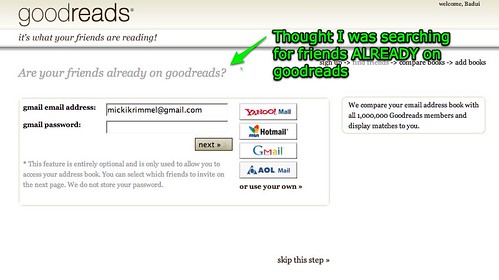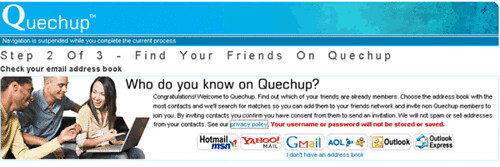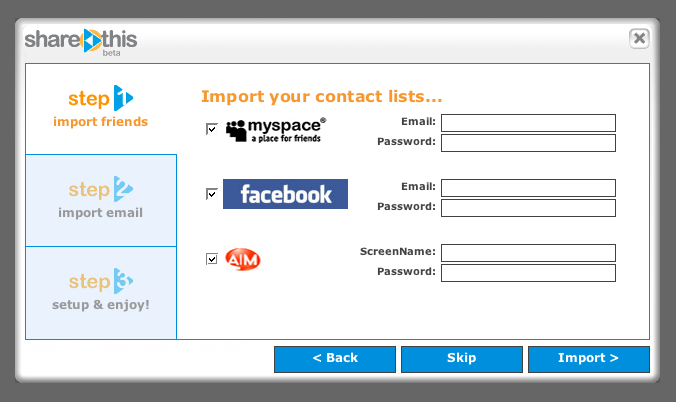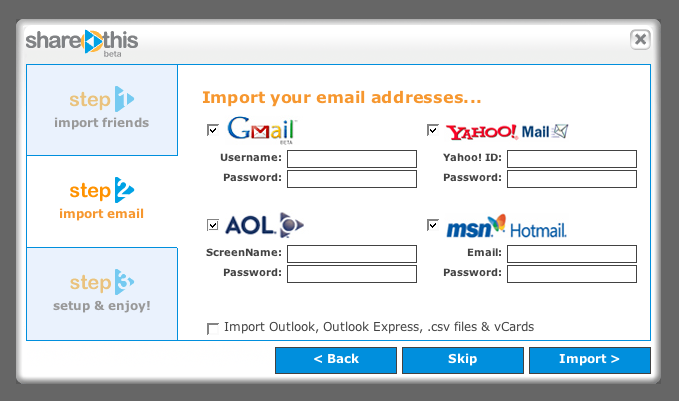social-network-anti-patterns
Social Network Anti-patterns
While social-network-portability documents what to do to put your site on the open social web and be a good user-centric service in general, it's been noted that not everyone follows such advice and instead opts for a bunch of alternative either one-off (wasteful) or downright user-unfriendly tactics. This page documents such anti-patterns of social network design and implementation and provides (unfortunately) real world examples of such badly designed sites.
Spam your contacts
Many social networking sites ask you to upload your address book, or "Find Your Friends", when what the feature really does is Spam your contacts.
These sites seem to use your uploading of an address book as tacit/implied permission to spam all your friends with invites, which will annoy your friends, and make you look foolish.
- Stephen Spillane apologized on 2008-05-15 to his friends for what sounds like involuntary spamming due to a social network invite:
"apologies to anyone who got an annoying invite from me to some stupid social network. The things men make me do"
Making users annoy, look dumb to their friends, and feel compelled to apologize is not good design.
This spamming behavior is now so bad, that users are creating new email accounts to knowingly avoid the problem:
- Lisa McMillan on Twitter 2007-08-31
"getting a special email account with no contacts for signing up to social networks. Then, I won't mind when they hijack my address book."
Solution: support social-network-portability instead, not address book spamming.
Read more about why this is an anti-pattern:
Here are some sites that are currently doing this:
Bebo invites
Bebo appears to have a user interface that makes it too easy for users to unintentionally spam everyone in their address book.
Evidence that users have unintentionally sending invite spam to their contacts:
As noted by user Valerie Noble on 2008-03-13:
"What the hell, I stupidly sent bebo invites to eveyone in my address book. Boo!"
and user C.K. Sample III on 2008-03-18:
"signed up for bebo. sorry to everyone in my address book who got spammed by the sign up. I thought it would work more like twitter"
Evidence that users are receiving Bebo invite spam:
Brian Alvey notes on 2008-03-19:
"Considering deleting the duplicate Bebo invitations I'm getting. Everyone has 3+ addresses for me. Another address book spam engine. Hurray!"
Still a problem as of May 2008:
Cameron Payne was unpleasantly surprised on 2008-05-15:
"goddamn Bebo just invited *everyone* in my Yahoo address book. I don't think I told it to do that. WTF!? Beware!"
Goodreads are your friends already on
Goodreads also has a user interface that misleads even very web-savvy users into unintentionally spamming everyone in their address book.
Micki Krimmell wrote both a blog post and a post on GetSatisfaction describing her experience with being tricked into spamming all her friends.
A representative from Goodreads has followed up on both Micki's blog post and Getsatisfaction post, however, as far as is known, Goodreads' user interface has not been changed/improved accordingly to be less misleading.
Quechup find your friends on
Quechup has a feature to "find your friends" which, even if it says "no contact present" will spam all your contacts in your address book and thus annoy all your friends and embarrass you. Clearly it is not just finding your friends from your address book, it is inviting everyone in your address book.
- 2007-07-31 BERT VAN WASSENHOVE: Quechup disaster
- 2007-09-02 Chris Hambly: Quechup And Mass Hysteria
- 2007-09-02 Mashable: Are You Getting Quechup Spammed?
- 2007-09-05 Brian Oberkirch: should google help us stop quechup spam?
Spock scan my address book
Enter your other site login and password
Also known as:
- "Enter your email login and password" anti-pattern.
- Third Party Password Antipattern (3ppantipattern, tppantipattern)
- Password Antipattern
Giving any site your login credentials/permissions for another site or service is a very bad idea. You cannot trust that the site will treat your login credentials with proper care (e.g. Quechup uses this antipattern to implement the spam everyone your the address book antipattern above).
It is also very bad user interface design. These sites that ask for your login (whether gmail or other services) are teaching users a very bad habit, a habit that is akin to what phishing sites depend on.
Don't ask users for their login and password to another site like gMail etc.
Solution: support social-network-portability.
Read more about why this is an anti-pattern:
- 2007-08-14 Brian Oberkirch: Two social system design trends that should really, really stop. like now.
- 2007-10-11 Jeremy Keith: The password anti-pattern
- 2008-01-04 Brian Oberkirch: this antipattern is kryptonite to the open social web
Here are some sites that are currently doing this:
Facebook see if more friends have joined
Facebook - Their "see if more friends have joined Facebook" feature provides you with a popup menu to enter passwords for numerous sites.
Nsyght import your profile and friends
Nsyght - Register for an account to import from Digg, Pownce, Last.fm, and Twitter (site is in public alpha)
- Unfortunately the "import from Digg, Pownce, Last.fm, and Twitter" feature depends on entering your username and password to those sites, which is ironic since those sites support microformats and social-network-portability!
Quechup which friends already use
ShareThis asks for your username and password to email services and social network sites.
Twitpic login to twitter
Twitpic asks you to enter your Twitter username and password. They are not the same site, nor are they run by the same people or company.
Twitter are your friends on
Twitter is a service that many users (including many of us active with microformats) love and adore and use constantly. Plus they implement microformats (e.g. hcard supporting user profiles and hcard xfn supporting friends lists)!
However, we still need to call them out for supporting the third-party password anti-pattern.
As co-authors of Oauth, please Twitter, implement and evangelize that path (perhaps even on that "are your friends on" page), rather than this anti-pattern.
TwitterNotes
TwitterNotes asks you to "login with your Twitter account" username and password. They are not the same site, nor are they run by the same people or company.
Join to fix your profile
Some social network sites create public profiles for you without you having any contact with them. If there are any mistakes, they make you join in order to fix them. This sounds like blackmail: Join our service or else we'll continue to publish inaccurate information about you and therefore spam websearch results about you with misinformation.
Spock join to fix
- 2007-08-15 Wired News: Astonishing! Spock Thinks You're a Pedophile
- 2007-12-16 Full Circle Associates: Please, don’t invite me to Spock
- 2007-12-16 Jim Benson: It May Be the Evil Spock (and An Initial Response to Spock)
One Unified Social Network
Several companies are trying to build the "one unified social network" (to rule them all) where they own/control the social network, and you're "allowed to" build applications on top of their proprietary platform. The most recent example of this is perhaps Facebook.
This is a bad idea for the same reason you don't see "one universal blogging service".
Other examples of folks walking down this path:
- Socialstream - a Google sponsored project at CMU. Key quote: "a unified social network that, as a service, provides social data to many other applications". See also references in this Forbes article: Google's Secret Society.
- ...
The hope is that these services will see the potential upside of providing open user profiles and social networks through social network portability and thus enable syndication of such data, as popular blogging services do.








